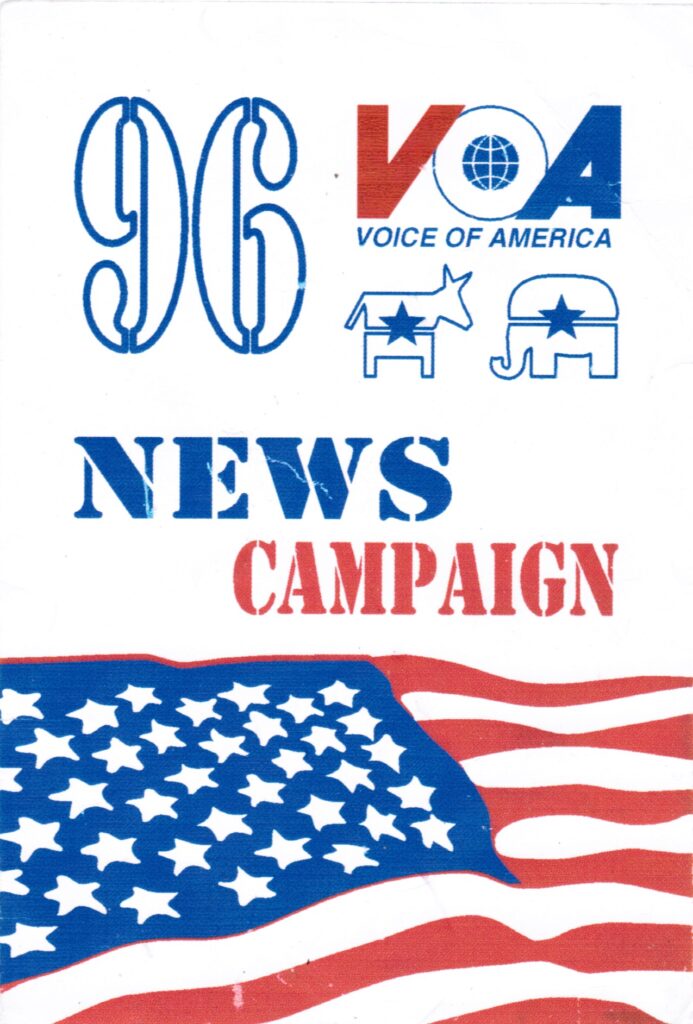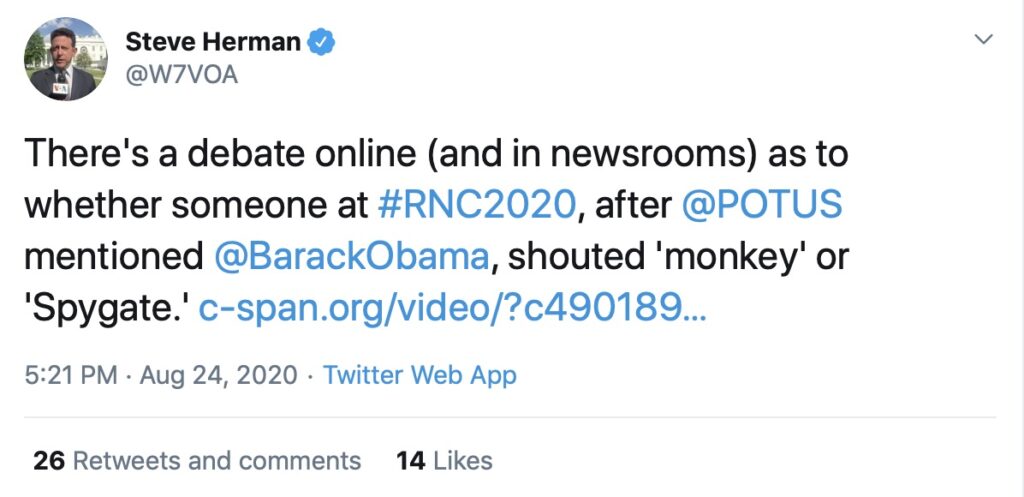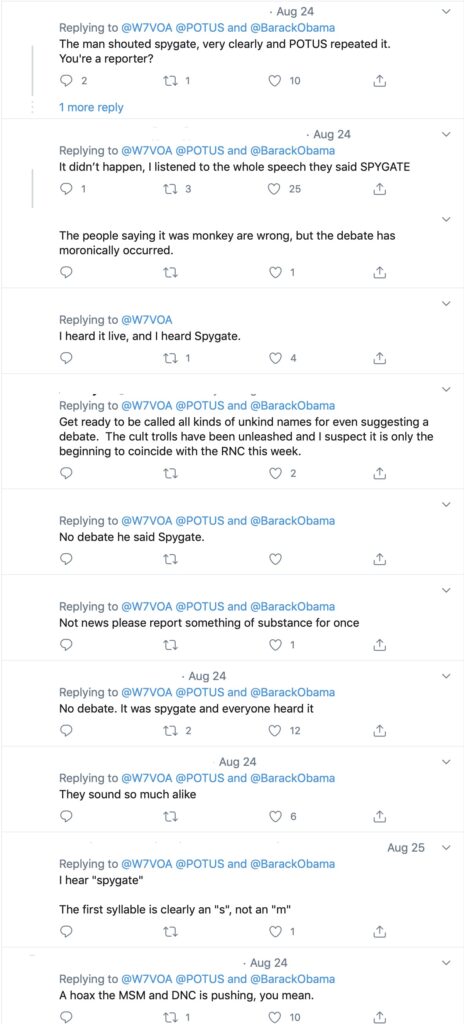Voice of America Election News 1996 – 2020 Went From Balance to Bias
USAGM Watch Commentary
The U.S. taxpayer-funded Voice of America (VOA) in the $800 million U.S. Agency for Global Media (USAGM) used to follow its VOA Charter in reporting on U.S. presidential elections. The charter, which is U.S. law, mandates that “VOA will represent America, not any single segment of American society, and will therefore present a balanced and comprehensive projection of significant American thought and institutions.“
This was true for VOA’s coverage of the 1996 U.S. presidential election campaign, as reported by Adrian Karmazyn who served as chief of Voice of America’s Ukrainian Service from 2005 to 2015. During his 27-year career at VOA he also worked as a reporter, program manager and producer. Adrian Karmazyn described his work in 1996 as a Voice of America Ukrainian Service reporter in his article, “VOA’s Ukrainian window on the 1996 Democratic Convention,” published in July 2020 in The Ukrainian Weekly.
Karmazyn’s article focuses largely on his coverage of the 1996 Democratic Party convention, but it shows that he was looking for balance and certainly did not engage in any kind of partisan propaganda.
Despite the importance of other issues, for many in the Ukrainian diaspora in the U.S.A. in 1996, foreign policy remained the priority issue. But, Orest Baranyk, a lifelong Republican and vice-president of the Ukrainian Congress Committee of America (UCCA), explained that voters can’t automatically assume that a Republican will be better for Ukraine, and noted that he was satisfied with Mr. Clinton’s policies regarding Ukraine: “Basically, the Ukrainian community was always more focused on foreign policy during the Cold War – it was the top issue. At that time, it looked like Republicans were more responsive to Ukrainian issues. I think that now it is not so straightforward, since in recent years we were able to have access to the Clinton administration, to have meetings with him and [Vice-President] Gore and others. They understand Ukrainian issues, and they are engaged. So, keeping this in mind, in this case, Clinton might be even more sensitive [than Dole] to Ukrainian issues.”
However, Myron Kuropas, also a Republican, who worked on ethnic affairs in the Gerald Ford White House, said he supports Bob Dole. Dr. Kuropas argued that Sen. Dole is an old and reliable friend of Ukrainian Americans. He recalled accompanying Mr. Dole to a meeting of the Conference on Security and Cooperation in Europe, focusing on the issue of fulfillment of the Helsinki Accords: “Dole truly understands our issues. Years and years ago, when Bill Clinton did not even know where to find Ukraine on a map, Dole was defending human rights and was on the Helsinki Commission. He travelled to Belgrade and I went with him – this was the first review of adherence to the principles of the Helsinki Accords, and he knows Ukrainians very well, and he knows our issues.”
Such previously balanced VOA’s coverage of U.S. politics started to give way to partisan bias in recent years. During the 2016 U.S. presidential election campaign, the VOA Ukrainian Service under new management, engaged in what can be described as unprecedented partisan journalism in violation of the VOA Charter. The service enhanced with Ukrainian subtitles and posted on social media without providing any context or balance an anti-Donald Trump video by Hollywood actor Robert De Niro. In the video shown with the VOA logo , De Niro’s descriptions of Donald Trump as “punk,” “dog,” “pig,” “con,” “buls**t artist,” “mutt,” “idiot,” “fool,” “bozo,” and “blatantly stupid” are translated into Ukrainian and used with the English soundtrack.
Ukrainian-American voters represent a portion of the VOA Ukrainian Service’s online audience. VOA Ukrainian Service did not report at the same time that another Hollywood actor, Jon Voight, defended Donald Trump after De Niro likened him to a dog and also said that he wants to punch Trump the face. The VOA Ukrainian Service video was the first time in Voice of America’s history that a threat of physical violence against an American politician was condoned in a VOA-produced program. The VOA Ukrainian De Niro partisan video was eventually removed, but only after outside protests were sent to the agency which was then known as the Broadcasting Board of Governors (BBG). In 2018, the agency adopted its current name, the U.S. Agency for Global Media. At the time of the posting of the De Niro video, Amanda Bennett was VOA Director and John Lansing, currently the head of National Public Radio (NPR), was in charge of USAGM (then under its BBG name) as its CEO.
Even though the Obama Administration-era senior management under whose watch the De Niro video was posted by the VOA Ukrainian Service in 2016 had departed in the early summer of 2020, the VOA Urdu Service did exactly the same thing in July 2020 by subtitling and posting a campaign video for Democratic Party presidential candidate former Vice President Joe Biden. Only this time, Trump-appointed new USAGM CEO Michael Pack quickly moved to have the video removed and suspended some of the VOA journalists and managers.
Some of the Voice of America English Newsroom reporters have also been criticized in comments posted under some of their tweets and reports for spreading unconfirmed partisan gossip.




